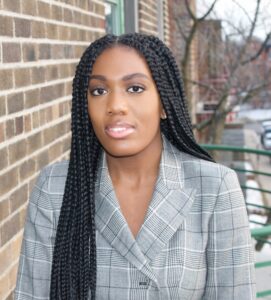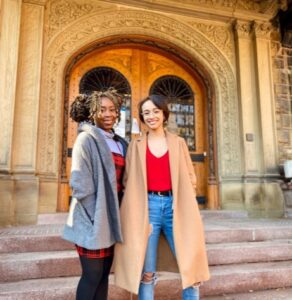Ommu-Kulsoom J. Abdul-Rahman, L.E.X. coordinator in 2021–2022
 What made you want to become a L.E.X. coordinator?
What made you want to become a L.E.X. coordinator?
I have been involved in a variety of outreach initiatives that have allowed me to work closely with youth from underrepresented backgrounds since I was 18. After volunteering with L.E.X. in 1L, I wanted to play a more important role in running the program as well as continue exploring new ways to improve our offerings. Being a coordinator allows me to do so while working in a field that I am passionate about.
Can you speak to the importance of programs such as L.E.X. in promoting a holistic approach to outreach for McGill Law?
Programs like L.E.X. are necessary for a holistic approach because many outreach programs at universities are focused on recruiting students rather than relationship building. Our focus at L.E.X. is building relationships with the schools and students that participate in our program. We are not only providing an inside look into what law school is like and what it took to get there, but also tailoring our program and projects to meet the needs of each individual community group that participates in it.
Camila Franco, L.E.X. Coordinator in 2020–2021
 What have been the most challenging and most rewarding parts of your experience working as a L.E.X. coordinator?
What have been the most challenging and most rewarding parts of your experience working as a L.E.X. coordinator?
Having the chance to connect with a young person in the community, demystify an aspect of the law, and dismantle what the stereotypical “law student” may look like is extremely gratifying. The most challenging aspect is the limited resources the program has to meet its important mandate. The reality is that the program can only be as good as its funding allows it to be. There are many committed faculty members and law student volunteers who are motivated to contribute to L.E.X. initiatives, but these aspirations cannot be realized without more resources.
Can you speak to the importance of programs such as L.E.X. in promoting a holistic approach to outreach for McGill Law?
During orientation, Dean Leckey celebrated how diverse our cohort was in measures of age, country of origin and fields of study, but he importantly noted that economic status was not part of this diversity: only 11% of our cohort was a first-generation post-secondary student. Programs like L.E.X. foster a more equitable access to opportunity. Through drop-in activities and legal education workshops, the Faculty is telling these young people that they are capable and worthy of our investment.
All of the L.E.X. program coordinators that I have known before and after me are women of colour. The more the faculty invests in diverse and underrepresented communities, the more these communities will not only thrive but likewise use their positions of privilege to open doors for those who may not have any doors opened by way of family networks.
Jemmy Erhiaganoma, L.E.X. coordinator in 2020–2021
 What made you want to become a L.E.X. coordinator?
What made you want to become a L.E.X. coordinator?
Having worked in the education sector, I am deeply passionate about initiatives centred on dismantling barriers to equitable education access. Volunteering as a L.E.X. student mentor was the most impactful part of my 1L and 2L experience. When the opportunity to serve as a L.E.X. coordinator presented itself, I jumped at the chance.
What have been the most challenging & most rewarding parts of your experience working as a L.E.X. coordinator?
Transitioning to a virtual model came with its unique set of challenges, and we realized early on that we would need to adjust our approach as well as our expectations. Nonetheless, it was a privilege to be part of such a resilient team that was committed to keeping the program running despite unpredictable circumstances. It was also an honour to hear from teachers expressing the impact that L.E.X. had on their students.
Bianca Braganza, L.E.X. Coordinator in 2019–2020
 What made you want to become a L.E.X. coordinator?
What made you want to become a L.E.X. coordinator?
L.E.X. is fundamental to attaining our vision of access to education and access to justice for marginalized communities. I have seen firsthand the impact our visits have had on children and youth. With sustained commitment, ongoing lessons, and familiar faces, the youth warm up to us, open up about their and their families’ experiences with the criminal justice system, their fears about pursuing higher education, and their hopes, dreams and desires for the future.
Can you speak to the importance of programs such as L.E.X. in promoting a holistic approach to outreach for McGill Law? How does this type of program contribute to improving equity not only in law schools but in the legal profession in general?
L.E.X. demonstrates that “equity and diversity” is not achievable by targeting only the representation of post-secondary students who apply to law school, as a vast majority of students face barriers even getting to that point. Access to education and access to justice begin with children and youth, by fostering mentorship, increasing exposure to fields like the law and beyond, and showing that underserved youth can exist – and thrive – in these spaces.
So many youths auto-select out of pursuing various paths because they think they cannot achieve it because they don’t see themselves represented. Early intervention is fundamental to supporting them as they enter high school and make key decisions about their futures. Youth outreach programs like L.E.X. can provide ongoing support and mentorship for youth that have the potential to increase the representation of racialized and/or lower-income students in post-secondary institutions at large, not only in law, by reducing psychological and potentially financial barriers to entry.
The interviews have been edited for length.
Support the L.E.X. Outreach Program
The McGill Law Graduating Class of 2011 is currently raising funds for a class gift to support the L.E.X. high school outreach program.
If you would like to contribute to the impact of L.E.X., you can give now to support the program or contact Ariel Swan, Development Officer at the Faculty of Law.
